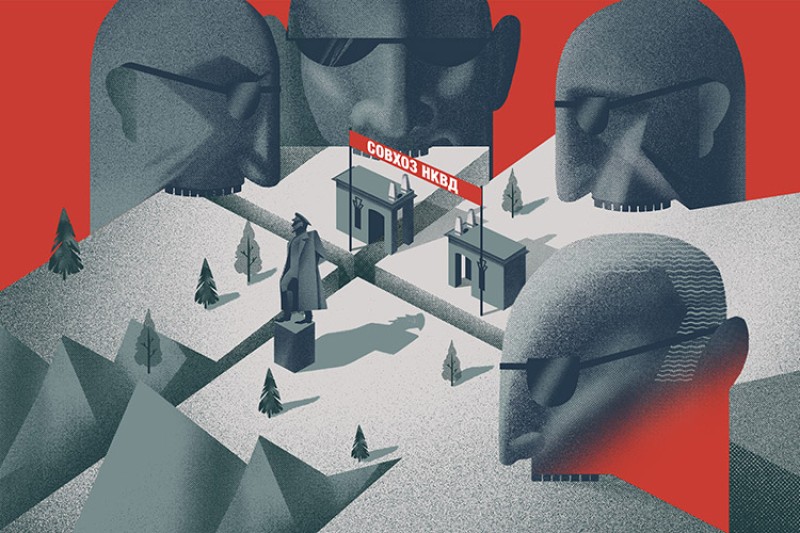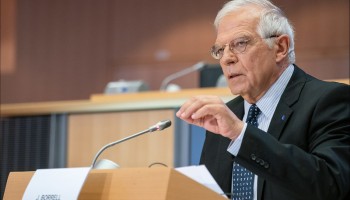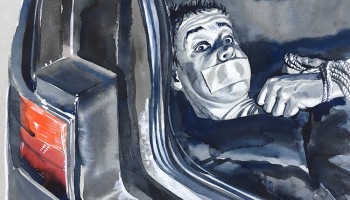Former bodyguards for Russian President Vladimir Putin have gained immense power in exchange for their unquestioned loyalty. Many have also accumulated vast wealth, exemplifying how Russia’s newly ascendant class has exploited a system meant to protect the old.
An investigation by Novaya Gazeta, a partner of the Organized Crime and Corruption Reporting Project, shows who paid the price: more than 1,100 ordinary people who had worked for decades on a giant poultry plant outside Moscow.
Some were decorated World War II veterans whom the Soviet Union had promised lifetime employment and pensions. But in the newly independent Russian Federation, there can be no such guarantees. During the 1990s, these workers say, a small clique of powerful businessmen and criminals used manipulation, forgery, intimidation, and even beatings to seize their land.
The dozens of hectares were then divided into smaller plots and eventually doled out to a cohort newly empowered by Putin: officers in the Federal Guard Service and the Presidential Security Service.
The three most prominent members of this clique — Viktor Zolotov, Oleg Klimentiev, and Alexei Dyumin — can be seen flanking Putin on an official trip to Helsinki in a 1999 television report. For years, this trio of bodyguards protected the president at work and at rest in Russia and abroad, and on one occasion even frightened away a bear from the leader’s mountain retreat.
Though they no longer shadow his every step, in some ways these men are closer to Putin than ever. Over the past five years, they and many of their colleagues have become a powerful new political clan wholly devoted to the president. Once responsible simply for physical safety, they have become governors, ministers, top commanders in the special services, and administrators of the president’s affairs.
They’ve also become rich by acquiring hectares of land in Russia’s most expensive territory at substantial — sometimes almost total — discounts.
Though some of the ordinary workers who lost their land are still fighting to reclaim it, the vast majority have long abandoned the cause without seeing justice. Their reward for a lifetime of labor now belongs to the newest members of Russia’s ruling class.
The Changing of the Guard
The composition of Putin’s inner circle has gradually shifted during his stewardship of Russia. One by one, former confidants have lost their positions, including neighbors from the "Ozero” dacha cooperative where the president owned an estate, fellow KGB operators, and old colleagues from the St. Petersburg mayor’s office.
The idea of replacing them with more trusted lieutenants arose after mass anti-government protests shook Russia in 2011-2012, according to an officer with the Presidential Security Service. Many still think these protests were orchestrated by unknown parties, he said, describing the events as a “failed conspiracy attempt.”
Meanwhile, Putin’s trust in Russia’s law enforcement agencies had been undermined by the constant intrigue among their leaders. The men from his personal guard, however, were devoted only to the president, the officer said.
These men, after all, had carried out Putin’s most delicate assignments, showed unwavering loyalty, and put their lives at risk.
They also possessed another quality: an apparently unconditional willingness to fulfill any presidential order. This is an especially valuable trait amid Russia’s many challenges, which include growing poverty, popular opposition to a recent increase in the national retirement age, and incessant confrontation with the West.
These are the circumstances under which Putin has appointed many of his former security officers to key government posts. The president’s idea was to create a “mighty fist” by naming loyal people to all the important power structures, said an employee of the Presidential Security Service who spoke on condition of anonymity.
Putin’s three top guards on his 1999 Helsinki trip are prime examples. Zolotov now heads the National Guard, Klimentiev is first deputy director of the Federal Guard Service, and Dyumin served as deputy defense minister and was then appointed governor of the Tula region. There are many other examples as well.
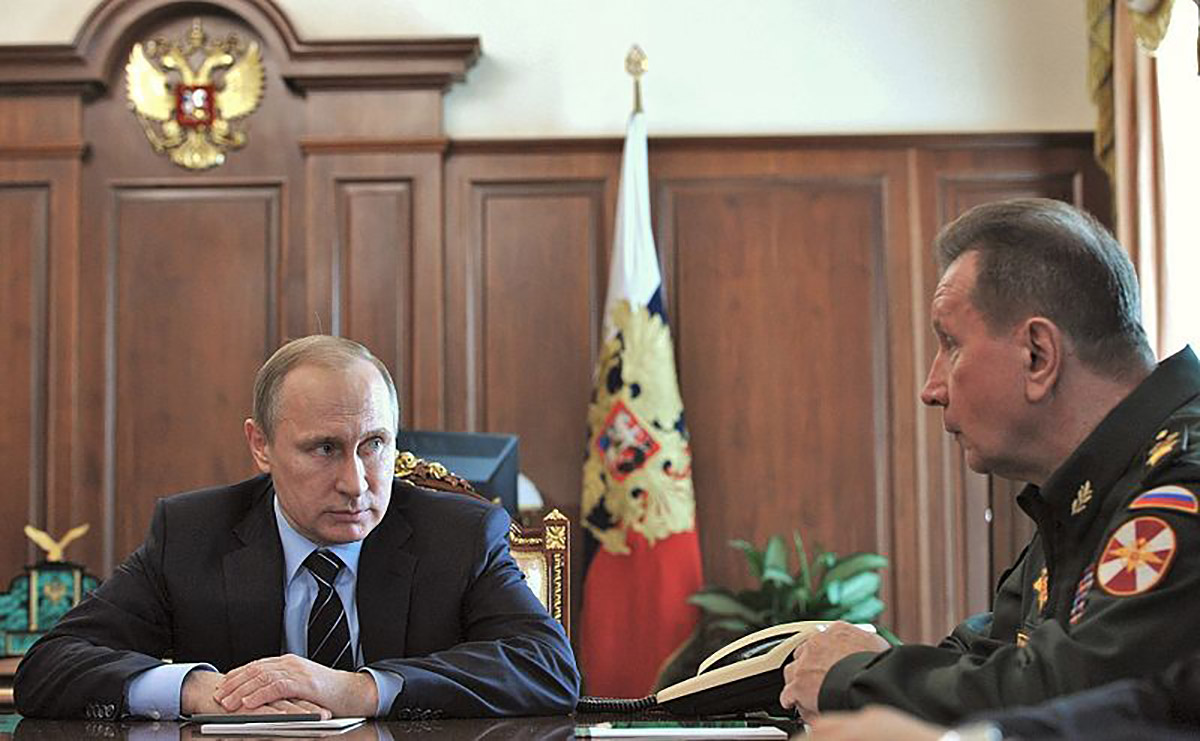 Vladimir Putin announces the creation of the National Guard in 2016. Viktor Zolotov is on the right. (Photo: The Kremlin)
Vladimir Putin announces the creation of the National Guard in 2016. Viktor Zolotov is on the right. (Photo: The Kremlin)
On the Rublevka
The story of the farm that ultimately enriched Putin’s bodyguards begins in 1924, in the early years of the Soviet Union. That’s when Felix Dzerzhinsky, known as “Iron Felix” for his leadership of the young country’s security apparatus, founded the Gorki-2 poultry breeding facility in a village of the same name near Moscow.
Established under the jurisdiction of the NKVD, the fearsome security agency that preceded the KGB, the farm provided agents with eggs and poultry meat. It grew to envelop land in nearby villages such as Znamenskoye, Zhukovka, Barvikha, and Kalchuga.
The Odintsovsky district, which enompasses them, stretches for some 65 kilometers to the west of Moscow. In the Soviet era, this area bore no association with luxury, but that has changed. The lightly wooded region, fed by the Moscow River, now contains some of Russia’s most expensive real estate.
That’s in large part thanks to Putin. Shortly after becoming president, he settled in the district at the Novo-Ogaryovo estate. Land values soon skyrocketed in the area, which is popularly known as the Rublevka (after a local highway). Today, the villages where the state poultry farm once operated have become the playgrounds of Russia’s wealthiest and most influential people.
Among them now are Putin’s former bodyguards, their relatives, and colleagues from the Presidential Security Service and the Federal Guard Service. In the mid-2000s, many members of these agencies received valuable property from the now-private poultry breeding farm or its subsidiaries. The land was bestowed at rock-bottom prices, in some cases for as little as 2 percent of its market value. Some guards built expensive homes on their new lots; others sold them and became millionaires.
The three men who accompanied Putin in Helsinki — Zolotov, Klimentiev, and Dyumin — are among those who did very well.
Zolotov’s son Roman and his son-in-law hold 2 hectares between them that could be worth over 1.5 billion rubles ($22.7 million) today.
Klimentiev, once described by colleagues as a “modest” man, received a plot, as did his then-16-year-old daughter. His declared income shot up to 21 million rubles (about $350,000) in 2015, the year he sold the land. Klimentiev’s wife Irina obtained property too, paying just 2 percent of the market price.
Dyumin also saw his family prosper. His father received almost half an acre in the Rublevka, his brother holds a large estate that could be worth $8 million, and even his brother-in-law acquired multi-million-dollar holdings.
(For more about these three men and their new properties, see: The Three Bodyguards and Their Riches)
The Security Capital
The nearby village of Soloslovo, just 15 minutes by car from Putin’s residence, can be described as the unofficial capital of the president’s security detail, given that so many of its members have acquired property there.
Zarya’s Founders
Alexander Kolpakov has served in the Federal Guard Service as deputy head of the special communications and information service since 2013. In 2014, he was appointed manager of the president’s affairs.
Sergei Shcherbakov was a major general of the Federal Guard Service and president of the Moscow Universal Fight Federation.
Nikolai Kondratyuk was head of the Federal Guard Service in Crimea from 2014 through 2017. Today, he is the state secretary and deputy director of the Federal Guard Service.
Gennady Yanko, a businessman.
The Soviet state farm owned large plots in Soloslovo. In August 2003, the private company that succeeded it — now called Agrokomplex Gorki-2 — sold 12 hectares in the village to a newly formed organization called Zarya.
Zarya soon became a mechanism for distributing this land to Putin’s former bodyguards. After gaining control of the 12 hectares, it divided the territory into 64 plots, and in 2004 started distributing them to Federal Guard Service and Presidential Security Service officers. And no wonder: Three of its four founders were high-ranking Federal Guard Service officers.
Among them was the leader, Nikolai Kondratyuk, who spent three years atop the division of the Federal Guard Service responsible for the occupied Ukrainian peninsula of Crimea. As Zolotov’s de-facto farm manager, he was also a sort of gatekeeper for land issues, said one colleague who spoke on condition of anonymity.
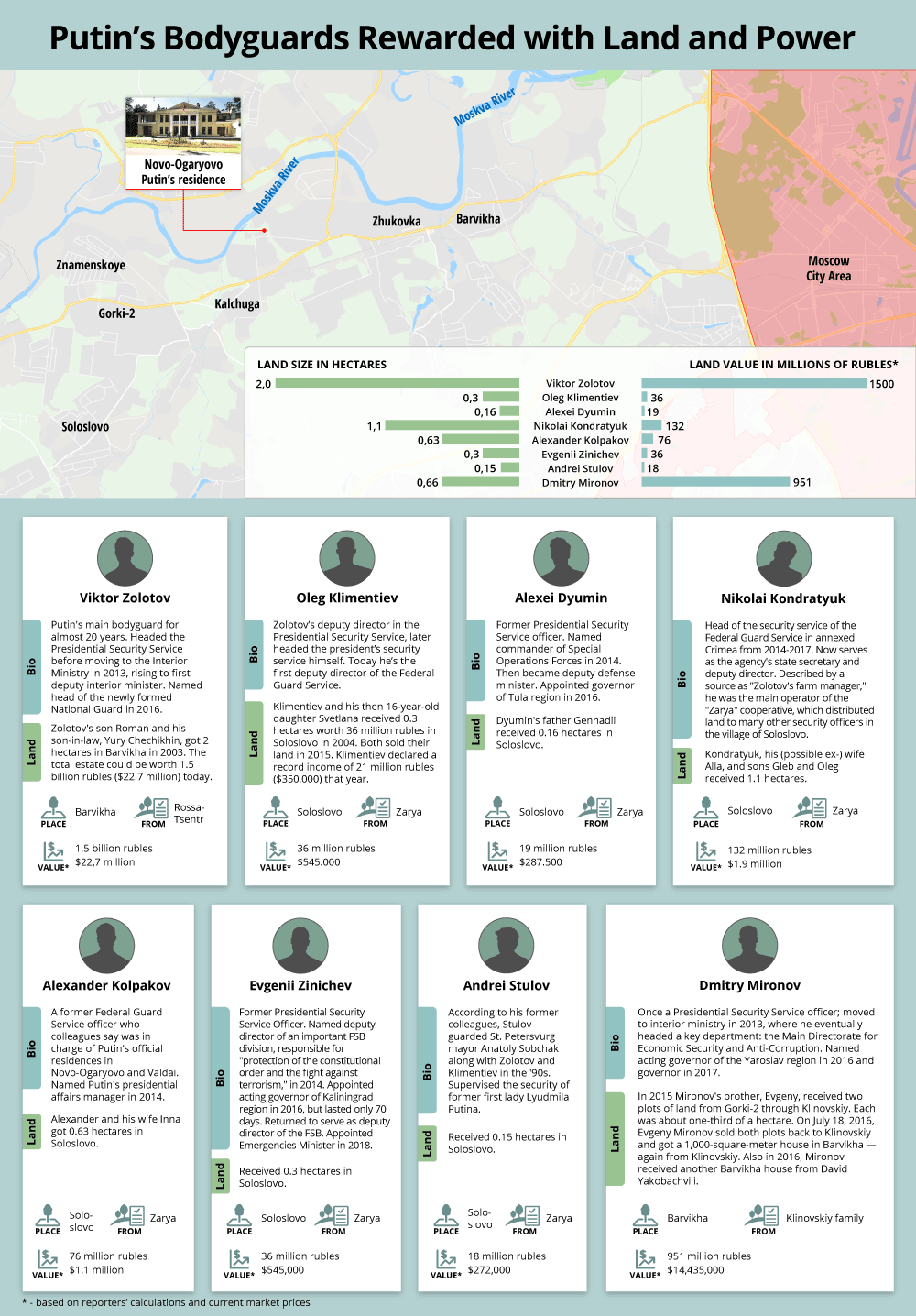 A partial listing of Putin's former bodyguards and their fellow officers who attained high positions — and got land in the Rublevka. Click to enlarge. (Credit: Edin Pasovic, OCCRP) Zolotov “always tried to take care of his own,” explains one Federal Guard Service officer, adding that security personnel were sometimes given land for their birthdays or to cover some need.
A partial listing of Putin's former bodyguards and their fellow officers who attained high positions — and got land in the Rublevka. Click to enlarge. (Credit: Edin Pasovic, OCCRP) Zolotov “always tried to take care of his own,” explains one Federal Guard Service officer, adding that security personnel were sometimes given land for their birthdays or to cover some need.
In his words, the officers either paid nothing for the Soloslovo plots or “bought them for some kind of ridiculous and symbolic amounts.”
His claims are supported by Zarya’s financial statements, which show that it sold 48 plots of land in 2004. On the open market, these sales would have brought Zarya between 315 and 733 million rubles ($10.9 million to 25.4 million), according to calculations based on prices provided by the Blackwood real estate agency. However, Zarya’s 2004 revenue was under 6 million rubles ($208,000).
Meanwhile, an intense struggle over the land was underway. Workers and pensioners from the former state farm, many of whom were elderly World War II veterans, claimed that the land had been stolen from them through threats, beatings, and forgeries.
One Against the System
Gorki-2, the village the poultry farm was named for, is home to a series of old five-story apartment buildings that stand in monotonous rows. They’re surrounded by the mansions of billionaires.
Almost every building, almost every apartment, is home to former workers from the Soviet farm. Reporters went door-to-door and talked to people on the street seeking explanations for what happened to the land in the 1990s. Many refused to speak. Some remembered being threatened while they fought for the property.
A central figure in the conflict is a pensioner named Nikolai Uvarov, who has filed numerous court appeals seeking to regain real estate he says had been promised to his father, Alexei.
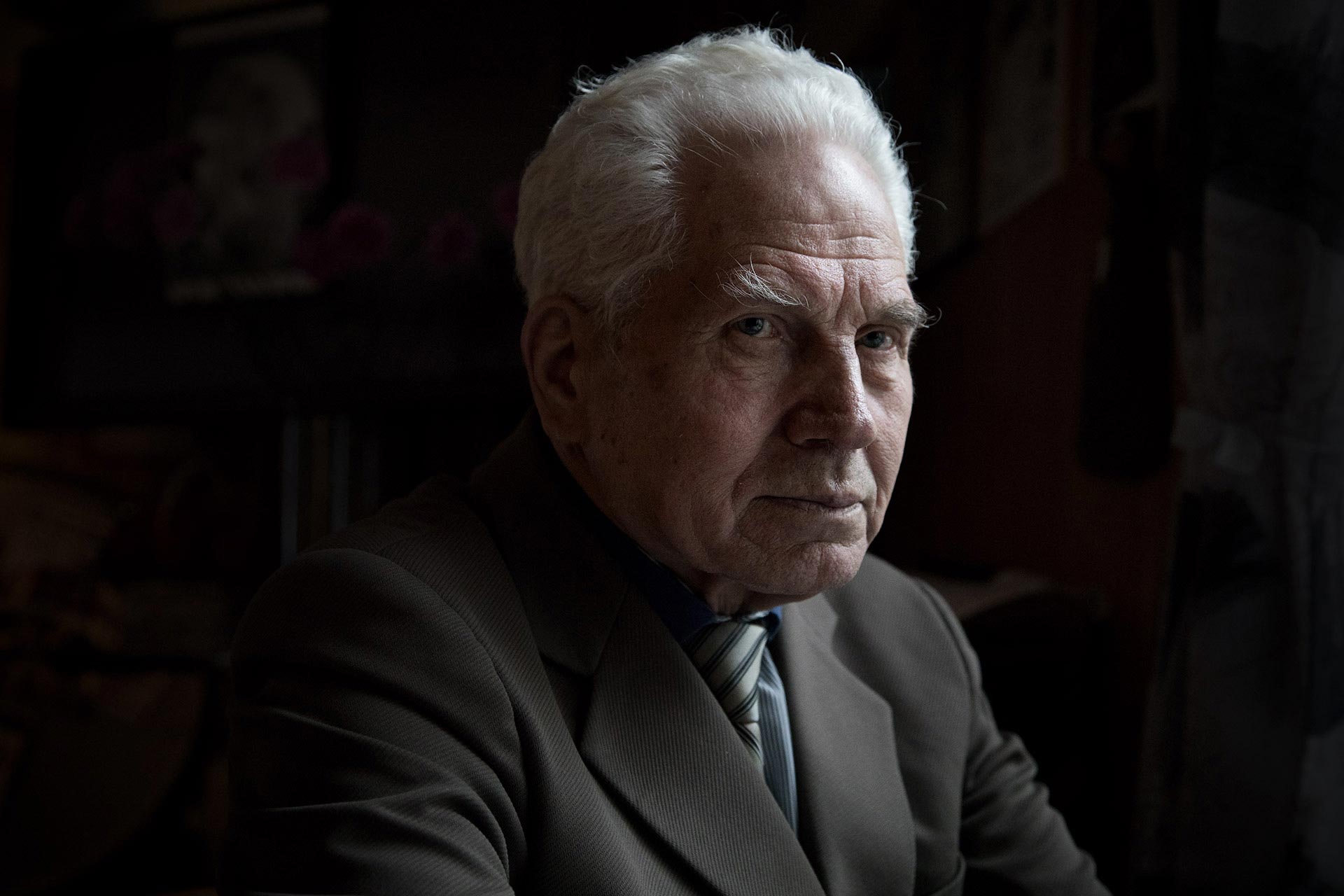 Nikolai Uvarov (Photo: Anna Artemeva, Novaya Gazeta)
Nikolai Uvarov (Photo: Anna Artemeva, Novaya Gazeta)
Sitting in his hundred-year-old dacha in an old village near Moscow, Nikolai said his father started working at the state farm in 1933, when he was 21 years old. Using a bewildering array of Soviet abbreviations, Alexei’s work there is recorded in his employment book, a standard document maintained by all Soviet laborers: “State Farm ‘Gorki-II’ KhPZO AKhU NKVD,” it reads.
The next item added to his father’s employment record was entered on June 23, 1941, the day after Nazi Germany invaded the Soviet Union: “Freed from work due to departure to the RKKA [Workers’ and Peasants’ Red Army].”
The elder Uvarov fought to defend Moscow that year, then served on the Belarusian front, where he was awarded the Order of the Patriotic War, Second Class, for coordinating the evacuation and repair of ammunition trucks under enemy fire.
Uvarov survived the war and returned to the farm in 1946: “Order of Lenin State Farm Gorki-2 NKVD USSR,” his employment record shows. He served as a driver for almost 40 years before retiring in 1984.
Signatures from Beyond the Grave
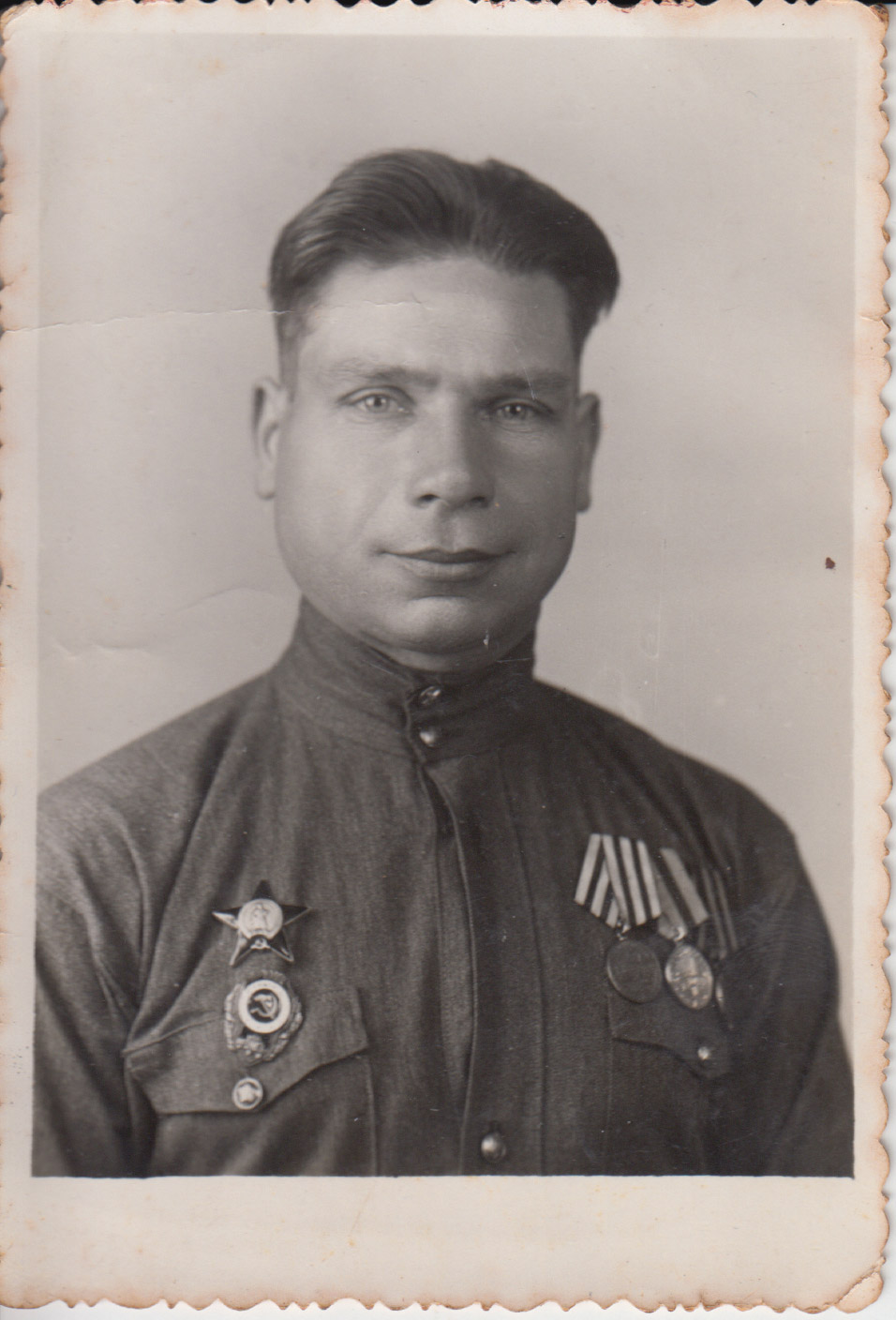 Alexei Uvarov. (Photo courtesy of Nikolai Uvarov) Nikolai Uvarov was born in the village of Gorki-2 in 1939, two years before his father went to war, and the farm has always been a part of his life. “I worked in the breeding plant when I was a schoolboy,” he says. “I helped in the fields, with weeding. And in high school I worked as a loader here to make some extra money.”
Alexei Uvarov. (Photo courtesy of Nikolai Uvarov) Nikolai Uvarov was born in the village of Gorki-2 in 1939, two years before his father went to war, and the farm has always been a part of his life. “I worked in the breeding plant when I was a schoolboy,” he says. “I helped in the fields, with weeding. And in high school I worked as a loader here to make some extra money.”
After the Soviet Union’s collapse, the Gorki-2 farm was privatized by its more than 1,100 workers and pensioners, dropped the word “state” from the name, and became simply the Gorki-2 Poultry Breeding Plant. As a retiree, Alexei Uvarov was entitled to his part. He died in 1996, bequeathing all his property to Nikolai.
Like all the other farm hands, Alexei Uvarov was supposed to receive 1.74 hectares of the property. Years later, when Nikolai sought documentation of his father’s plot, he was surprised to discover that he had inherited 15 preferred shares in the farm rather than any actual real estate. It appeared that his father had received the shares in exchange for contributing his land to the company that ran Gorki-2.
But there was a big problem: The land exchange was dated 1998, two years after the elder Uvarov’s death.
That’s when Nikolai realized someone had likely forged documents to steal his inheritance. After starting his own investigation, he discovered that the same thing had happened to many other workers.
Uvarov began to fight, and soon a group of similarly deceived shareholders joined him. They struggled for years, but most gave in. Some died as the litigation dragged on. Some agreed to small amounts of compensation.
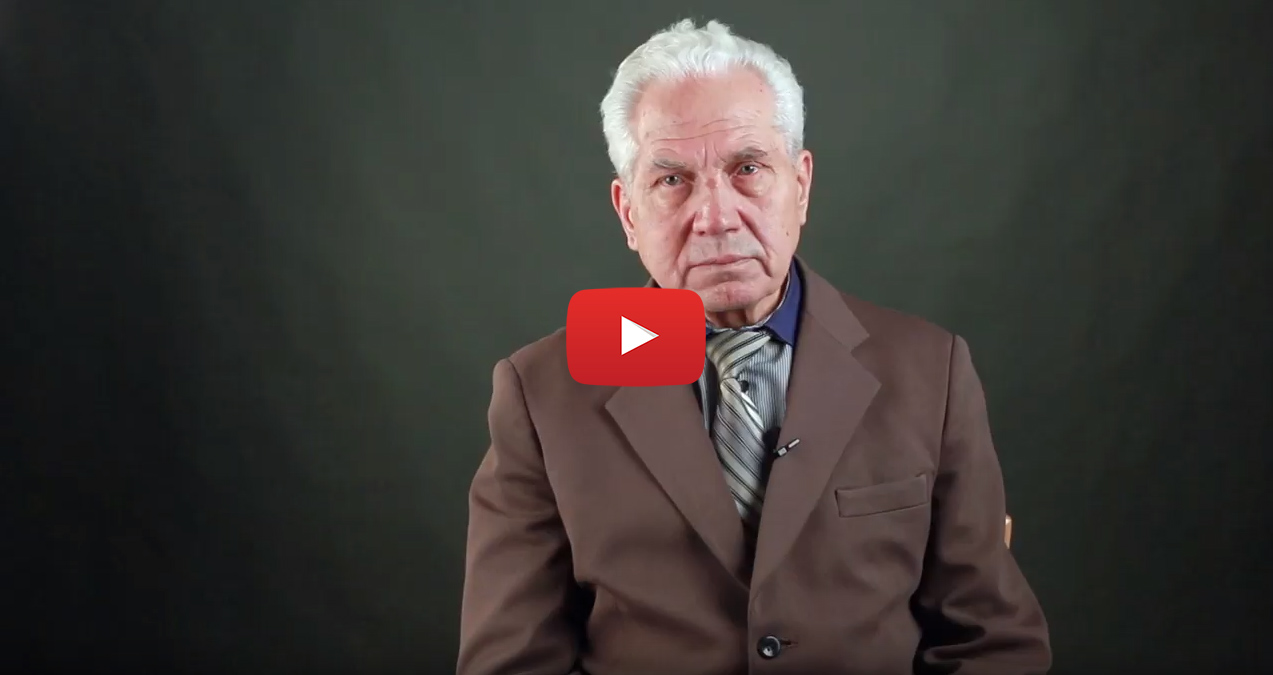 Nikolai Uvarov remembers growing up in Gorki-2. Click to watch.Only Uvarov is still battling, having tried for almost 20 years to prove what he calls the “fraud and theft” of his land. He has lost scores of legal cases, written dozens if not hundreds of complaints, received threats, and survived a brutal assault. He has even rejected an offer of 10 million rubles for his plot, still determined to prove the original wrongdoing.
Nikolai Uvarov remembers growing up in Gorki-2. Click to watch.Only Uvarov is still battling, having tried for almost 20 years to prove what he calls the “fraud and theft” of his land. He has lost scores of legal cases, written dozens if not hundreds of complaints, received threats, and survived a brutal assault. He has even rejected an offer of 10 million rubles for his plot, still determined to prove the original wrongdoing.
Now almost 80 years old, he can still summon specific dates and numbers of the various rulings by heart. And he’s collected an archive of documents that show precisely what happened.
“They Betrayed Us”
The Gorki-2 land-grab wasn’t especially innovative. Similar schemes were used throughout Russia, though the resulting court decisions reached an unparalleled level of absurdity in the Moscow region, according to a lawyer who has represented workers and spoke on condition of anonymity.
In May 1998, a man named Mikhail Troshkov appeared at a workers’ meeting about the Gorki-2 farm. Though he hadn’t worked a single day there, Troshkov nevertheless steered the agenda, announcing to all those gathered that they would become shareholders in the company that owned the facility. Each person would receive 15 preferred shares in exchange for their land.
The company’s executives supported Troshkov’s proposal, and by Sept. 30, 1998, the swaps had been made in over a thousand separate cases.
“They betrayed us,” Uvarov says. “Most people’s signatures were forged. Those who worked [at the plant] in Gorki-2 were forced to sign [the documents] under threat of dismissal. What were they supposed to do?”
A copy of Viktor Rumyantsev's death certificate shows that he died on October 29, 1997.
A copy of a document, dated September 28, 1998, which attests that Viktor Rumyantsev is exchanging his land on the Gorki-2 plant to the company for 15 preferred shares. The document is "signed" by Rumyantsev, though he had died about a year ago.
Uvarov’s father, the World War II veteran who had died two years earlier, was listed among those who signed the deal. So was Viktor Rumyantsev, who had died in 1997. Uvarov eventually found over 100 such cases.
Signatures of the living were also apparently forged. Many who said they were swindled participated in class-action lawsuits. Uvarov says he himself has represented the interests of 27 people in court. No matter the proof submitted, judges rejected the claims.
Take World War II veteran Ivan Chuprov, for example, who was disabled after serving as a mortarman and being wounded in 1943. In 2004, he appealed to the Moscow Region Arbitration Court seeking the return of his 1.74 hectares. He hadn’t wanted to exchange his land, he said, and the signature on the certificate was a fake.
A document showing that Ivan Chuprov received a total of 253 rubles in dividends from his shares in the Gorki-2 plant between 2000 and 2002.
His request that the court appoint a handwriting expert was denied, in part, the court said, because Chuprov had received dividend payments from the farm between 2000 and 2002. The payments amounted to 253 rubles (about $8).
Losing their real estate was only the first stage of the workers’ disenfranchisement. They had lost their land, but formally they remained the farm’s owners. However, no one person or company could really seize control of the property unless they either bought a majority of outstanding shares from the workers or persuaded the Gorki-2 Poultry Breeding Plant to issue additional shares. Mikhail Troshkov’s next step was to execute option two.
A Temporary Owner
In October 1998, right after the workers’ land was swapped for preferred shares, almost 400,000 additional common shares in the company were issued. The amount was five times as many as had previously existed, and massively diluted the value of the workers’ holdings. Moreover, unlike the preferred shares, the new common stock bestowed its owners with voting power at shareholder meetings.
Troshkov, the same man who initiated the controversial land swap, became one of the biggest acquirers of the newly issued shares.
He had never worked the land and shouldn’t have been eligible to participate in the secondary stock offering, which was supposed to be open only to existing shareholders. But Anatoly Cherkasov, the farm’s general director, empowered Troshkov by gifting him two shares in advance. Though their nominal value was just 2 rubles, the transaction allowed Troshkov to participate in the share sale.
He bought about 12 percent of the offering for just 50,000 rubles ($4,500).
Soon it became clear that he, and other recipients of the new shares, were just stand-ins for three long-time business associates who would become the plant’s new owners. Without explanation, Troshkov simply gifted his newly acquired shares to the trio, helping the men gain control of hectares of land in the Rublevka.
“People Were Hungry. So They Sold.”
One of the recipients was Timofei Klinovsky, today one of the biggest landowners in this prestigious and expensive area. At the end of the 1990s, he was just beginning to buy Rublevka property. The former state farm seems to have become his main target, and after receiving Troshkov’s shares, he started buying workers out of theirs.
“They sold them. Some drank. Some … well, people were hungry. So they sold,” Uvarov said. One of his legal cases unearthed documents showing that Klinovsky paid just 14 rubles per share: about $7 for each packet of 15 that workers had received.
Today Klinovsky has a palace in the village of Zhukovka, within walking distance of Zolotov’s mansion. The luxury here is impressive even by Rublevka standards. Video of the estate taken from a drone shows an area of more than 3 hectares stretching along the Moscow River. It includes a tennis court, promenades, trimmed trees, and manicured lawns. The house looks like a royal residence.
Control of the breeding plant brought Klinovsky a fortune, as well as access to valuable connections. When billionaires and public officials started moving to the Rublevka in the early 2000s, they acquired land from him and his companies. Some became his neighbors. These included the president’s bodyguards and prominent FSB generals, such as Vladimir Anisimov, the agency’s former deputy director; and Sergei Shishin, the former head of its support service.
The Entrepreneurs
In Russia, the last decade of the 20th century is popularly referred to as the “wild ‘90s,” and for good reason. Almost every business, no matter how large or small, had to deal with gangsters who wanted money or influence.
That’s why it’s hard to imagine that a little-known entrepreneur such as Troshkov would independently be able to seize thousands of hectares of land near Moscow. He would have needed influential and powerful allies.
It turns out, he had them.
Troshkov was employed by a holding company called Trinity, which eventually became one of the major co-owners of the Gorki-2 farm, along with Klinovsky. Behind Trinity were two businessmen with criminal connections, David Yakobashvili and Gavril Yushvaev.
Dividing the Spoils
After the workers’ and pensioners’ shares were diluted, David Yakobashvili, Gavriil Yushvaev, and Timofei Klinovsky became the largest shareholders of the Gorki-2 farm. By the middle of 1999, Klinovsky owned almost 8 percent of the company, based on quarterly reports. Through Trinity, Yakobashvili and Yushvaev owned 19.5 percent.
The last available report is dated 2015, when Yushvaev owned almost 35 percent of the enterprise directly, Yakobashvili almost 29 percent, and Klinovsky together with his wife almost 36 percent.
The company’s first serious business was selling used cars from the United States. One of its early operators, Vladislav Vanner, led the Bauman criminal gang, an influential crew in Moscow at the time. Vanner was shot and killed by another gangster in 1994.
“We were friends,” Yakobashvili said of his relationship with Vanner in a 2004 interview with the Russian Forbes.
“I helped him and he helped me,” he said. “If he grew up in the Bauman district, that doesn’t mean he was the head of a [criminal] group. And anyway, what is the Bauman criminal group? The press doesn’t understand a lot of things. They’ve seen too many mafia films.”
Yakobashvili’s second partner and Trinity co-owner, Yushvaev was convicted of robbery in 1980 and served nine years in Soviet prison camps. Upon his release, he became Yakobashvili’s partner in Trinity and in the well-known Moscow casino, Metelitsa.
Today, the Russian Forbes estimates Yushvaev’s fortune at $1.4 billion. He is one of the hundred wealthiest people in the country.
Birthday Shoot-Out
Yushvaev’s name reappeared in the headlines in 2017. That Nov. 17, he attended the birthday party of Dmitry Pavlov, a businessman with criminal connections who was known to law enforcement as “Pavlik.” Also in attendance were other well-known criminal leaders, including Oleg Shishkanov, who this August was elected by his fellow outlaws as Russia’s “Number One Thief-in-Law.”
At the birthday party in a restaurant in Moscow’s Oko tower, a shootout erupted between Yushvaev and Pavlov’s bodyguards, some of whom worked for a company that belonged to the National Guard. One person was killed and five wounded.
Yakobashvili confirmed that, along with his partners, Yushvaev and Klinovsky, he had become a shareholder of the Gorki-2 plant in the late 1990s. The business supplied milk for the Lianozovsky dairy plant, in which both he and Yushvaev had interests, Yakobashvili said.
The businessman denied any knowledge of any deals between the farm and the president’s bodyguards.
The workers’ complaints about the land-for-shares deal and subsequent maneuvers should be treated with understanding and some skepticism, he said.
“No one seized anything. We bought shares. If someone doesn’t like the price today, what can you say? Those who sold bitcoins many years ago could argue today that they weren’t purchased at the market price.”
Reporters were unable to contact Troshkov. None of the security officers who received land responded to requests for comment.
Attacks on Activists
Nikolai Uvarov’s fight for his father’s property brought grave consequences.
In one of his court cases in 2005, a lawyer who represented the farm took him aside and allegedly threatened him. Uvarov told police that “[the lawyer] broke into obscene language, promised to rape me in a perverted way, to throw me out of a train ... and [made] many other threats, including [taking my life].”
In a police interrogation on Feb. 26, 2006, the lawyer denied the charges: “The facts described in [Uvarov’s] statement are an invention,” he said.
Nine days later, on March 7, Uvarov was fiercely attacked on the street.
“They wanted to kill me. It was my birthday. I was walking home from the tax office ... It was about 1:00 p.m. I noticed a car there. And somehow I don’t remember anything else. It seems that they stunned me, so that I … well, they tore me all up: knocked out my teeth, broke my collarbone, beat my hands,” he said.
Uvarov was rescued by two old women who started screaming, scared off the attackers, and took him to the hospital. He had a fractured skull, open fractures of both wrists, multiple bruises, and open wounds.
The attackers were never found, and the criminal case was soon suspended. Uvarov made many appeals, calling for the courts to force the police to undertake a serious search. In 2010, the court received a striking response: “The criminal case has been lost … measures are being taken to establish the location of the criminal case.”
On the same day that Uvarov was beaten, another Gorki-2 shareholder was also attacked.
Tamara Semenova was a leader of Peasants’ Front, an organization that united not only many of the Gorki-2 workers, but also other farmers who had lost their land. The group held demonstrations attended by thousands in the center of Moscow and even blocked the Rublevo-Uspensky highway near Putin’s residence.
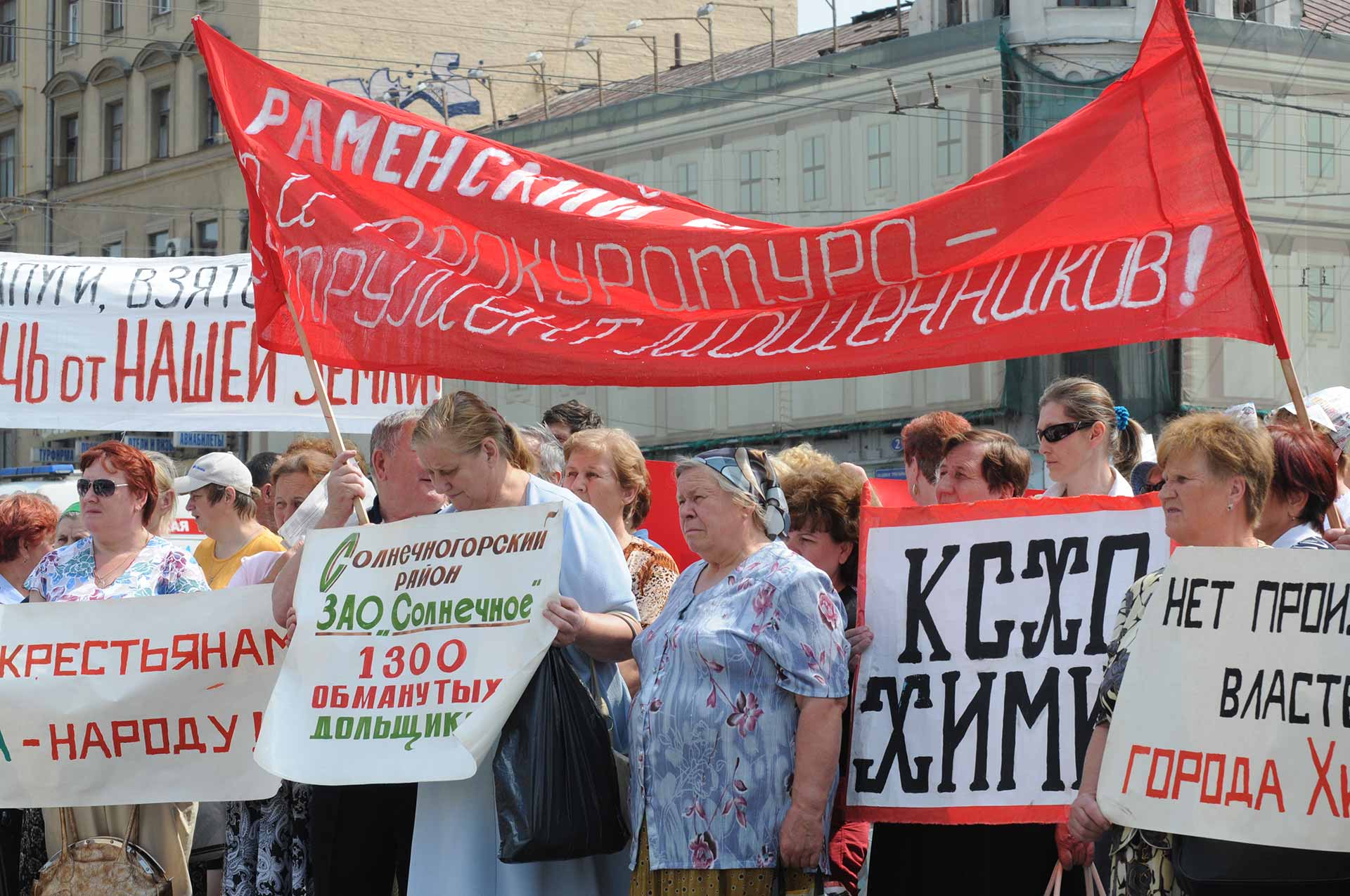 A Peasants’ Front demonstration. (Photo: Provided by participants)
A Peasants’ Front demonstration. (Photo: Provided by participants)
Eventually, this seemed to make a difference.
A lawyer who represented the workers and spoke on condition of anonymity said that after the demonstrations, the president’s administration began to act, asking the farm owners to solve the “peasant question.” Soon, the lawyer said, they started offering to buy the workers’ shares at “decent prices.”
At the very end of 2006, leaflets were distributed in Gorki-2 offering to pay workers 50,000 rubles ($1,900) for each preferred share in the company.
An owner of 15 preferred shares stood to receive 750,000 rubles ($28,500), still much lower than the market price for 1.74 hectares of Rublevka land, but many times the 210 rubles that Klinovsky had paid in the early 2000s. The new amount was 3,600 times what he had offered just a few years earlier.
Not all the workers benefited. Some had died. Uvarov, on the other hand, refused to sell the shares he had inherited from his father. He’s still writing complaints and filing court cases.
“I decided to go to the end, until I can prove this fraud and theft. If I sold, then I would betray ... the other people I defended,” Uvarov said. “Until I resolve this, I’m not going to quiet down.”
So Close, and Yet So Far
The saga of the Gorki-2 land contains several episodes when justice was almost achieved, only to be denied.
One government body, the Federal Agency for State Property Management, has been trying to prove since 2007 that the transfer of land from the workers to the farm had been illegal, making the affair “an unlawful transfer of state property into private hands.”
The legal conflict continued with varying success, with the Gorki-2 farm winning the first two court decisions, only for a federal court to overturn the results. The state agency then prevailed again in the lower courts, returning the matter to the same federal bench.
This time, the court upheld the lower court rulings, deciding against the Federal Agency for State Property Management. It was July 2009, just as the brother of one of the president’s most trusted bodyguards received his plot from the farm, and not long before the wife of another security officer received hers.
In 2012, Uvarov saw a glimmer of hope that a criminal case would be launched regarding his father and war veteran Ivan Chuprov.
“I got an appointment with [Investigative Committee head Alexander] Bastrykin. It seemed like everything was decided positively. I thought everything went fine,” he recalled.
That April, the Investigative Committee of the Moscow region received documents pertaining to Uvarov and Chuprov’s claims that their signatures had been falsified and their land stolen. On examining them, an investigator suspected that a crime may have been committed by Anatoliy Cherkasov, the farm’s general director; and Alexander Gladyshev, the former head of the Odintsovsky district.
But soon the investigator was transferred, and the case stalled again.
This spring Uvarov sent another complaint to Putin, who had just been elected to his third term as president.
“I had already tried this 10 times,” he said. “They conveyed my appeal to [Investigative Committee head] Bastrykin. And then Bastrykin’s office writes [that] they sent my documents to lower departments.”
Uvarov’s failure to win back his land may suggest why its new owners would sell some of it to former members of Putin’s security detail at steep discounts: It may have been a form of insurance.
As long as portions of the property belonged to a powerful clique connected to the president, it is unlikely that any judge would rule in favor of the dispossessed workers and pensioners.
Uvarov seems to have reached this conclusion himself. On hearing that some of the real estate had long been divided among the president’s bodyguards, he wasn’t surprised.
“This was done to block our documents, if they ever get to the FSB or anywhere else,” he said. “Putin will never betray his people.”
